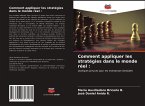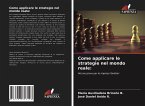An adequate strategy (plan, course or guide of conscious and deliberate action to achieve specific goals) originates in the analysis of attitudes and capabilities of the company. The book synthesizes results of a study based on a stratified probabilistic sample of 237 companies in 5 municipalities of Merida (Venezuela), descriptive statistical analysis and SWOT analysis. The objectives were: 1) to build a referential framework on Family Businesses, their strategies according to the stage of the life cycle and their role in the processes of local economic development; and, 2) to empirically contrast these links in a specific territory. The main findings show the potential of family businesses to contribute to local development. Thus, although those in the Gestation phase predominate with a tendency towards Development, all of them can adopt strategies appropriate to their stage in the life cycle. The resulting strategies (market development, product development or penetration/risksharing/strategic alliances) are examples of how to take advantage of favourable factors available in the territory to overcome weaknesses and generate social capital.
Bitte wählen Sie Ihr Anliegen aus.
Rechnungen
Retourenschein anfordern
Bestellstatus
Storno








